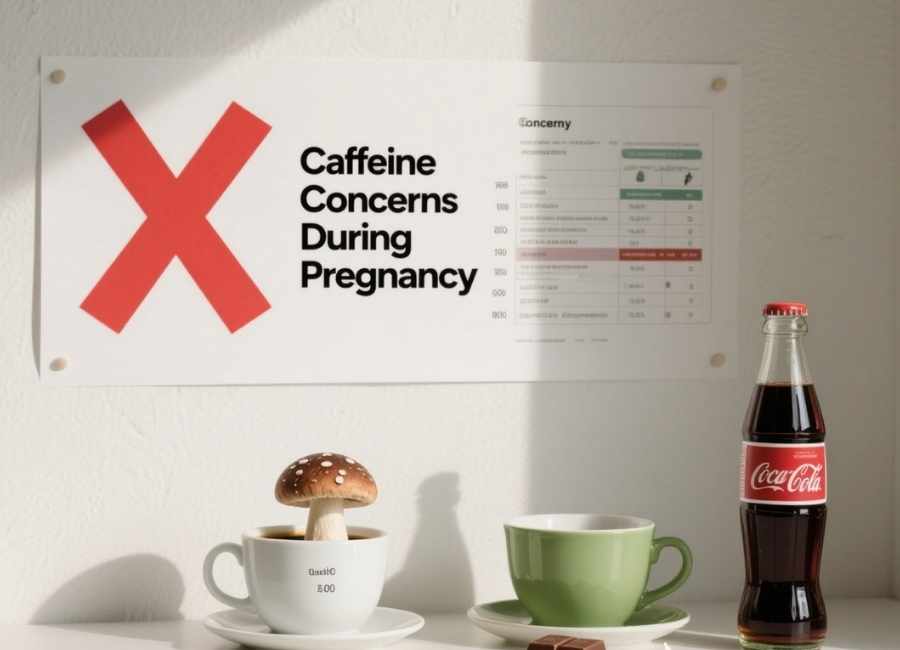If you’re pregnant, you might be curious about which foods and drinks are safe. Mushroom coffee has become a trendy alternative to regular coffee, blending coffee with mushrooms such as lion’s mane, chaga, and reishi. It’s a good idea to consider if this drink is suitable for you during pregnancy.
To decide if mushroom coffee is safe while you’re pregnant, it’s important to consider both the coffee and the mushrooms in it. Some people pick it for its lower caffeine, while others are interested in possible health benefits. However, since there isn’t much research on eating these mushrooms during pregnancy, it’s best to be careful.
This guide explains the safety, potential benefits, and risks of drinking mushroom coffee while pregnant. You’ll find information on caffeine content, the kinds of mushrooms used, and other options, so you can make the best choice for you and your baby.
What Is Mushroom Coffee?

Mushroom coffee is created by blending ground coffee beans with powdered mushrooms. Popular varieties include lion’s mane for brain support, chaga for antioxidants, cordyceps for energy, and reishi for stress relief. The amount of mushroom in each blend can vary depending on the brand.
Mushroom coffee usually has 50-70% less caffeine than regular coffee, making it appealing if you want to reduce your caffeine intake. Many brands claim it provides steady energy without the jitters or crashes of regular coffee. However, the amount of mushrooms in each product can vary a lot. Some have only small amounts for marketing, while others include higher doses that might affect your body. This wide variation makes it hard to judge how safe mushroom coffee is during pregnancy.
Caffeine Concerns During Pregnancy

The American College of Obstetricians and Gynecologists recommends limiting caffeine intake to 200 milligrams per day during pregnancy. (How much coffee can I drink while I’m pregnant?, 2020) This equals roughly one 12-ounce cup of regular coffee. Excessive caffeine consumption has been linked to increased risk of miscarriage, low birth weight, and preterm delivery. (Klebanoff & A., 1999)
A cup of mushroom coffee usually has between 40 and 100 milligrams of caffeine, depending on how much coffee and mushroom are used and how strong it’s brewed. While this lower caffeine level may seem safer, it’s still important for pregnant women to consider caffeine from other sources like tea, chocolate, and soft drinks.
The body processes caffeine more slowly during pregnancy, particularly in the second and third trimesters. During pregnancy, your body breaks down caffeine more slowly, especially in the later months. (Coffee During Pregnancy – A Trimester-by-Trimester Guide, 2025) This means caffeine stays in your system longer and can affect both you and your baby. Even though mushroom coffee has less caffeine, it’s still important to watch how much you drink and when, as it’s largely unstudied. Most research on mushrooms like lion’s mane, chaga, and reishi focuses on their effects in non-pregnant adults. (Can You Eat Mushrooms During Pregnancy?, 2023) This lack of pregnancy-specific data creates uncertainty about their safety profile.
Mushroom Safety During Pregnancy

Certain mushrooms have natural compounds that might influence your hormones or immune system. Since pregnancy already brings major changes in these areas, adding mushrooms could have effects on your baby’s development that aren’t fully understood.
While some traditional medicines have used certain mushrooms during pregnancy, the concentrated powders in today’s mushroom coffee are not the same. The way these products are made and the amount of mushrooms they contain are very different from traditional uses. For example, lion’s mane is thought to support brain health, but we don’t know how it affects pregnancy. Some animal studies suggest it could change nerve growth, which raises questions about its impact on a baby’s brain development.
Chaga contains high levels of antioxidants, which generally benefit health. However, its immune-modulating properties could potentially interfere with the natural immune system changes that occur during pregnancy to protect the developing fetus. (Chaga Mushroom: Uses, Benefits and Side Effects, n.d.)
Reishi is sometimes called the “mushroom of immortality” and is used to help with stress and sleep. These benefits might sound helpful during pregnancy, but reishi can also change blood pressure and blood sugar, which need to be watched closely when you are pregnant.
Cordyceps is marketed for energy and athlCordyceps is sold as a way to boost energy and athletic performance. It can affect blood flow and how your body uses oxygen, which could possibly change blood flow to the placenta. However, there are no studies that have looked at this in pregnancy. (How to use cordyceps, n.d.) Mushroom coffee may cause digestive upset, particularly for pregnant women already experiencing morning sickness or increased sensitivity to foods. Some people report headaches, dizziness, or allergic reactions to functional mushrooms, symptoms that could be more concerning during pregnancy.
Since supplements aren’t closely regulated, mushroom coffee might have unwanted ingredients or different amounts of mushrooms than the label claims. This matters even more during pregnancy, when it’s important to avoid anything that could be harmful. There’s also a chance that mushroom coffee could interact with other supplements you take, like prenatal vitamins or iron. Because these interactions haven’t been well studied, there’s extra uncertainty about safety.
Expert Recommendations

Most healthcare providers suggest being careful with mushroom coffee during pregnancy. Because there isn’t much safety information and it’s important to avoid anything that could harm your baby, they usually recommend avoiding it or only having a very small amount.
Dietitians who help pregnant women often recommend sticking to foods that are proven to be safe and nutritious, rather than trying new supplements or drinks that haven’t been well studied. Pregnancy is usually not the right time to experiment with your diet.
If you’re considering drinking mushroom coffee while pregnant, talk to your doctor first. They can review your health, your pregnancy, and other factors to give you advice that’s right for you.
Safe Alternatives to Consider
Several pregnancy-safe alternatives can provide energy and health benefits withouThere are several safe alternatives during pregnancy that can give you energy and health benefits without the unknowns of mushroom coffee. Decaf coffee lets you enjoy the taste and routine without worrying about caffeine. Herbal teas like ginger or chamomile are comforting and have a known safety record. Green tea has less caffeine than coffee and provides antioxidants, but it’s still best to drink it in moderation. Fresh fruit smoothies are another great option, giving you natural energy from vitamins and sugars without caffeine or unfamiliar ingredients.o coffee but do not have caffeine or mushrooms. These choices let you keep your morning routine while staying safe during pregnancy.
Making an Informed Decision
When deciding about mushroom coffee during pregnancy, consider your total caffeine intake, your health, and how you feel about possible risks. Some women choose to avoid it completely because of the unknowns, while others may have a small amount after checking with their doctor.
If you choose to try mushroom coffee while pregnant, keep a record of any symptoms or reactions you notice. Also, track your daily caffeine intake to make sure you stay within safe limits.
Keep in mind that pregnancy does not last forever, and you can try mushroom coffee after breastfeeding if you want to see its benefits. For now, choosing options that are known to be safe is usually the best choice during this important time.
Prioritizing Safety During This Special Time
There isn’t a clear answer about whether mushroom coffee is safe during pregnancy because there isn’t enough research on these mushrooms in pregnant women. While having less caffeine might seem like a good thing, the unknown effects of concentrated mushroom ingredients on your baby are a real concern.
The safest option is to talk to your doctor before adding mushroom coffee to your diet during pregnancy. They can help you weigh the risks and benefits for your situation. With so many safe choices available, you can keep your energy and routine without taking extra risks.
You may want to wait until after pregnancy and breastfeeding to try mushroom coffee, so you don’t have to worry about your baby’s development. Choosing safe options now helps protect your baby’s health and gives you peace of mind during these important months.



















